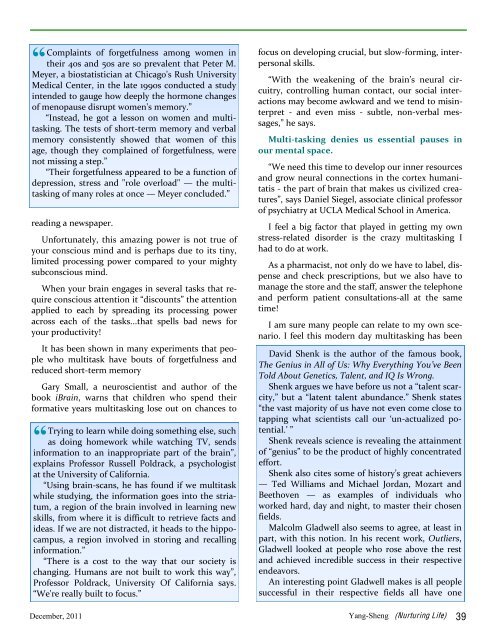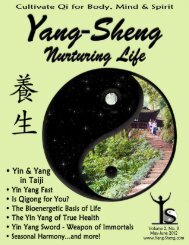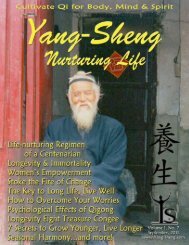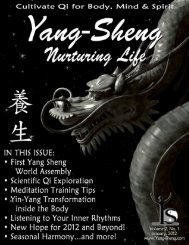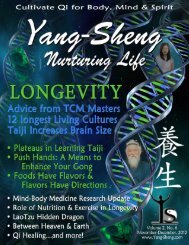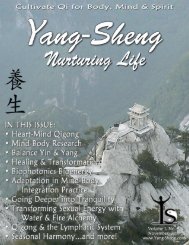Download the December issue of Yang-Sheng as
Download the December issue of Yang-Sheng as
Download the December issue of Yang-Sheng as
You also want an ePaper? Increase the reach of your titles
YUMPU automatically turns print PDFs into web optimized ePapers that Google loves.
“ Complaints <strong>of</strong> forgetfulness among women in<br />
<strong>the</strong>ir 40s and 50s are so prevalent that Peter M.<br />
Meyer, a biostatistician at Chicago's Rush University<br />
Medical Center, in <strong>the</strong> late 1990s conducted a study<br />
intended to gauge how deeply <strong>the</strong> hormone changes<br />
<strong>of</strong> menopause disrupt women's memory.”<br />
“Instead, he got a lesson on women and multi‐<br />
t<strong>as</strong>king. The tests <strong>of</strong> short‐term memory and verbal<br />
memory consistently showed that women <strong>of</strong> this<br />
age, though <strong>the</strong>y complained <strong>of</strong> forgetfulness, were<br />
not missing a step.”<br />
“Their forgetfulness appeared to be a function <strong>of</strong><br />
depression, stress and "role overload" — <strong>the</strong> multi‐<br />
t<strong>as</strong>king <strong>of</strong> many roles at once — Meyer concluded.”<br />
reading a newspaper.<br />
Unfortunately, this amazing power is not true <strong>of</strong><br />
your conscious mind and is perhaps due to its tiny,<br />
limited processing power compared to your mighty<br />
subconscious mind.<br />
When your brain engages in several t<strong>as</strong>ks that re‐<br />
quire conscious attention it “discounts” <strong>the</strong> attention<br />
applied to each by spreading its processing power<br />
across each <strong>of</strong> <strong>the</strong> t<strong>as</strong>ks...that spells bad news for<br />
your productivity!<br />
It h<strong>as</strong> been shown in many experiments that peo‐<br />
ple who multit<strong>as</strong>k have bouts <strong>of</strong> forgetfulness and<br />
reduced short‐term memory<br />
Gary Small, a neuroscientist and author <strong>of</strong> <strong>the</strong><br />
book iBrain, warns that children who spend <strong>the</strong>ir<br />
formative years multit<strong>as</strong>king lose out on chances to<br />
“ Trying to learn while doing something else, such<br />
<strong>as</strong> doing homework while watching TV, sends<br />
information to an inappropriate part <strong>of</strong> <strong>the</strong> brain”,<br />
explains Pr<strong>of</strong>essor Russell Poldrack, a psychologist<br />
at <strong>the</strong> University <strong>of</strong> California.<br />
“Using brain‐scans, he h<strong>as</strong> found if we multit<strong>as</strong>k<br />
while studying, <strong>the</strong> information goes into <strong>the</strong> stria‐<br />
tum, a region <strong>of</strong> <strong>the</strong> brain involved in learning new<br />
skills, from where it is difficult to retrieve facts and<br />
ide<strong>as</strong>. If we are not distracted, it heads to <strong>the</strong> hippo‐<br />
campus, a region involved in storing and recalling<br />
information.”<br />
“There is a cost to <strong>the</strong> way that our society is<br />
changing. Humans are not built to work this way”,<br />
Pr<strong>of</strong>essor Poldrack, University Of California says.<br />
“We're really built to focus.”<br />
focus on developing crucial, but slow‐forming, inter‐<br />
personal skills.<br />
“With <strong>the</strong> weakening <strong>of</strong> <strong>the</strong> brain’s neural cir‐<br />
cuitry, controlling human contact, our social inter‐<br />
actions may become awkward and we tend to misin‐<br />
terpret ‐ and even miss ‐ subtle, non‐verbal mes‐<br />
sages,” he says.<br />
Multi‐t<strong>as</strong>king denies us essential pauses in<br />
our mental space.<br />
“We need this time to develop our inner resources<br />
and grow neural connections in <strong>the</strong> cortex humani‐<br />
tatis ‐ <strong>the</strong> part <strong>of</strong> brain that makes us civilized crea‐<br />
tures”, says Daniel Siegel, <strong>as</strong>sociate clinical pr<strong>of</strong>essor<br />
<strong>of</strong> psychiatry at UCLA Medical School in America.<br />
I feel a big factor that played in getting my own<br />
stress‐related disorder is <strong>the</strong> crazy multit<strong>as</strong>king I<br />
had to do at work.<br />
As a pharmacist, not only do we have to label, dis‐<br />
pense and check prescriptions, but we also have to<br />
manage <strong>the</strong> store and <strong>the</strong> staff, answer <strong>the</strong> telephone<br />
and perform patient consultations‐all at <strong>the</strong> same<br />
time!<br />
I am sure many people can relate to my own sce‐<br />
nario. I feel this modern day multit<strong>as</strong>king h<strong>as</strong> been<br />
David Shenk is <strong>the</strong> author <strong>of</strong> <strong>the</strong> famous book,<br />
The Genius in All <strong>of</strong> Us: Why Everything You’ve Been<br />
Told About Genetics, Talent, and IQ Is Wrong.<br />
Shenk argues we have before us not a “talent scar‐<br />
city,” but a “latent talent abundance.” Shenk states<br />
“<strong>the</strong> v<strong>as</strong>t majority <strong>of</strong> us have not even come close to<br />
tapping what scientists call our ‘un‐actualized po‐<br />
tential.’ ”<br />
Shenk reveals science is revealing <strong>the</strong> attainment<br />
<strong>of</strong> “genius” to be <strong>the</strong> product <strong>of</strong> highly concentrated<br />
effort.<br />
Shenk also cites some <strong>of</strong> history’s great achievers<br />
— Ted Williams and Michael Jordan, Mozart and<br />
Beethoven — <strong>as</strong> examples <strong>of</strong> individuals who<br />
worked hard, day and night, to m<strong>as</strong>ter <strong>the</strong>ir chosen<br />
fields.<br />
Malcolm Gladwell also seems to agree, at le<strong>as</strong>t in<br />
part, with this notion. In his recent work, Outliers,<br />
Gladwell looked at people who rose above <strong>the</strong> rest<br />
and achieved incredible success in <strong>the</strong>ir respective<br />
endeavors.<br />
An interesting point Gladwell makes is all people<br />
successful in <strong>the</strong>ir respective fields all have one<br />
<strong>December</strong>, 2011 <strong>Yang</strong>-<strong>Sheng</strong> (Nurturing Life) 39


